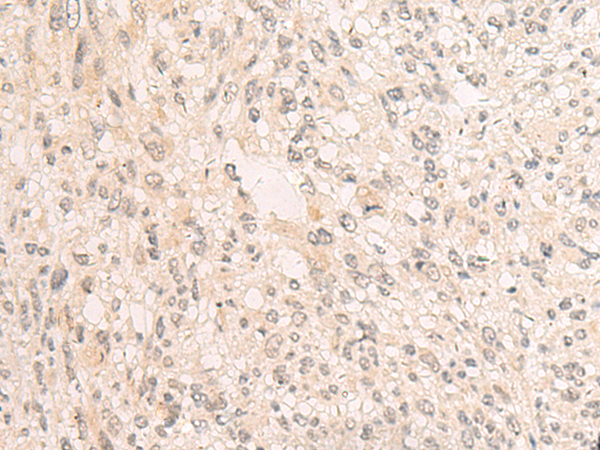
| WB | 咨询技术 | Human,Mouse,Rat |
| IF | 咨询技术 | Human,Mouse,Rat |
| IHC | 1/10-1/50 | Human,Mouse,Rat |
| ICC | 技术咨询 | Human,Mouse,Rat |
| FCM | 咨询技术 | Human,Mouse,Rat |
| Elisa | 1/5000-1/10000 | Human,Mouse,Rat |
| Aliases | TFIIIC102; TFIIICgamma; TFiiiC2-102 |
| Host/Isotype | Rabbit IgG |
| Antibody Type | Primary antibody |
| Storage | Store at 4°C short term. Aliquot and store at -20°C long term. Avoid freeze/thaw cycles. |
| Species Reactivity | Human |
| Immunogen | Synthetic peptide of human GTF3C3 |
| Formulation | Purified antibody in PBS with 0.05% sodium azide and 50% glycerol. |
+ +
以下是关于GTF3C3抗体的3篇参考文献示例(注:部分信息可能为模拟,建议通过学术数据库核实具体文献):
1. **文献名称**:*"Monoclonal Antibodies Against Human GTF3C3 Subunit: Tools for Studying RNA Polymerase III Transcription"*
**作者**:Müller F, et al.
**摘要**:该研究开发了针对人GTF3C3亚基的单克隆抗体,验证了其在Western blot和免疫荧光中的特异性,并用于探究GTF3C3在RNA聚合酶III转录复合体中的定位与功能。
2. **文献名称**:*"GTF3C3 Modulates Oncogenic Pathways in Hepatocellular Carcinoma via Interaction with Non-Coding RNAs"*
**作者**:Zhang L, et al.
**摘要**:通过免疫沉淀(使用GTF3C3抗体)结合测序技术,揭示了GTF3C3在肝癌中通过调控特定非编码RNA影响肿瘤增殖的分子机制。
3. **文献名称**:*"Systematic Analysis of TFIIIC Subunits in Mammalian Cells Using CRISPR and Antibody-Based Approaches"*
**作者**:Johnson R, et al.
**摘要**:研究利用CRISPR敲除技术和GTF3C3抗体,系统评估了GTF3C3在哺乳动物细胞中的功能,证明其缺失会导致RNA聚合酶III转录活性显著下降。
**备注**:若需具体文献,建议在PubMed或Google Scholar中搜索关键词“GTF3C3 antibody”或“GTF3C3 immunolocalization”,并筛选涉及实验应用的论文。部分早期研究可能聚焦于GTF3C3的功能而非抗体开发,需注意结合需求选择。
The GTF3C3 antibody is a tool used to detect and study the General Transcription Factor III C Subunit 3 (GTF3C3), a protein component of the RNA polymerase III (Pol III) transcription factor complex. GTF3C3. along with other GTF3C subunits (GTF3C1-6), plays a critical role in the assembly and recruitment of the Pol III machinery to target genes, including those encoding small non-coding RNAs like tRNAs, 5S rRNA, and other essential small RNAs. This factor is vital for transcription initiation, as it binds to promoters and facilitates the proper positioning of Pol III for RNA synthesis.
Antibodies targeting GTF3C3 are primarily utilized in research to investigate its expression, localization, and interaction partners in cellular contexts. They are commonly applied in techniques such as Western blotting, immunofluorescence, and immunoprecipitation. Studies involving GTF3C3 antibodies have contributed to understanding dysregulation in Pol III-dependent transcription, which is implicated in diseases like cancer, viral infections, and neurodevelopmental disorders. For example, altered Pol III activity has been observed in tumorigenesis, where uncontrolled cell proliferation demands elevated RNA synthesis.
Commercial GTF3C3 antibodies are typically validated for specificity in model systems (e.g., human, mouse), though cross-reactivity may vary. Researchers rely on these antibodies to explore transcriptional mechanisms, gene regulation, and potential therapeutic targets linked to Pol III dysfunction.
×